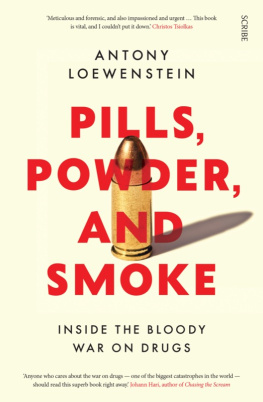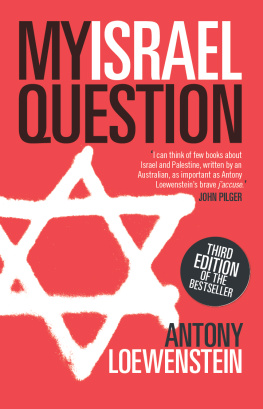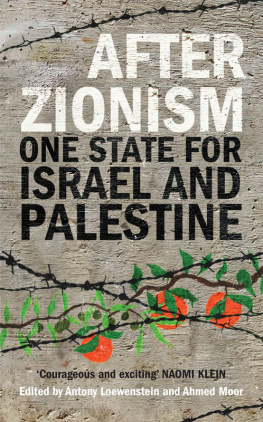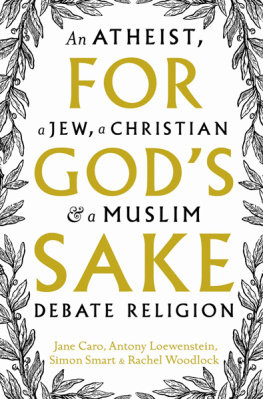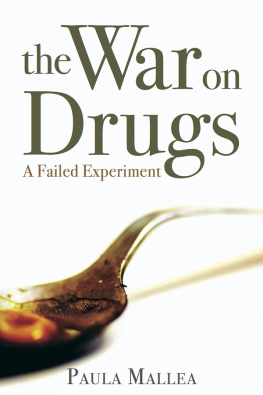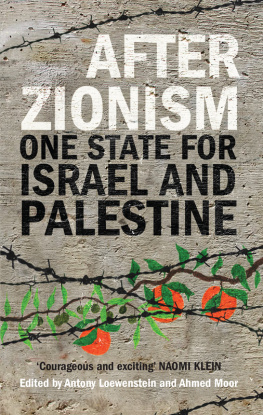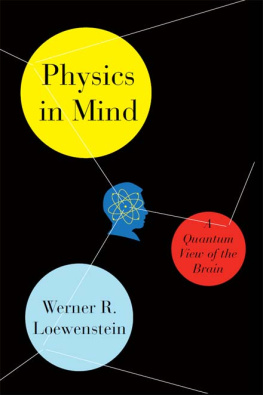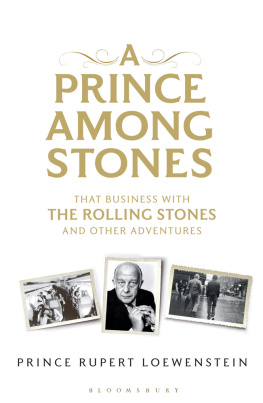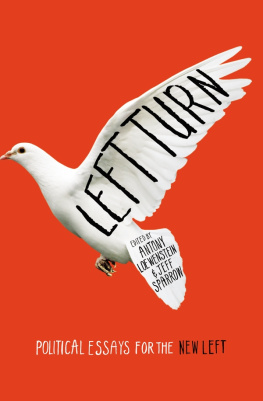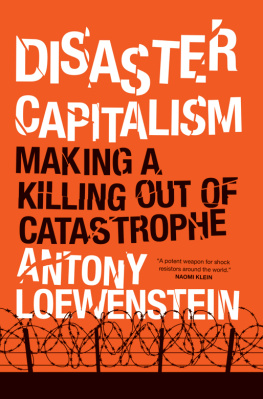
PILLS, POWDER, AND SMOKE
Antony Loewenstein is a Jerusalem-based Australian journalist who has written for The New York Times , The Guardian , the BBC, The Washington Post , The Nation , the Huffington Post , Haaretz, and many others. He is the author of Disaster Capitalism: making a killing out of catastrophe , writer/co-producer of the documentary Disaster Capitalism, and co-director of an Al Jazeera English film on the opioid drug tramadol. His other books include My Israel Question , The Blogging Revolution , and Profits of Doom, and he is also the co-editor of the books Left Turn and After Zionism , and a contributor to For Gods Sake .
antonyloewenstein.com @antloewenstein
Scribe Publications
1820 Edward St, Brunswick, Victoria 3056, Australia
2 John St, Clerkenwell, London, WC1N 2ES, United Kingdom
3754 Pleasant Ave, Suite 100, Minneapolis, Minnesota 55409, USA
First published by Scribe in Australia, New Zealand and North America 2019
Published by Scribe in the United Kingdom 2020
Copyright Antony Loewenstein 2019
All rights reserved. Without limiting the rights under copyright reserved above, no part of this publication may be reproduced, stored in or introduced into a retrieval system, or transmitted, in any form or by any means (electronic, mechanical, photocopying, recording or otherwise) without the prior written permission of the publishers of this book.
The moral rights of the author have been asserted.
9781925713367 (Australian edition)
9781947534940 (US edition)
9781912854240 (UK edition)
9781925693768 (e-book)
Catalogue records for this book are available from the National Library of Australia and the British Library.
scribepublications.com.au
scribepublications.co.uk
scribepublications.com
To the millions of drug-war victims around
the world who deserve a life of peace.
Contents
Introduction
Every one of the bastards that are out for legalizing marijuana is Jewish. What the Christ is the matter with the Jews? I suppose it is because most of them are psychiatrists.
US PRESIDENT RICHARD NIXON
Washington has never fought a war on drugs, but it has fought multiple wars fuelled by drugs. Controlling drug supply was rarely if ever a priority. Understand this, and you get how powerful the drug war has been in the public imagination for over one hundred years. Trillions of dollars spent, millions of lives lost, surging drug use and abuse around the world, and apocalyptic violence caused by illicit substances all look like failures. But dont be fooled; this was always the inevitable by-product of trying to control an industry thats led by the insatiable appetite for drugs in every corner of the globe.
From US president Richard Nixon, who unleashed the war on drugs in 1971 and called drug abuse public enemy number one, to President Donald Trump, who called in 2018 for drug dealers to be given the death penalty, this war has been fought across multiple administrations, nations, continents, communities, and generations. It has killed, maimed, enslaved, and imprisoned millions, with the annual global value of drug-trafficking worth hundreds of billions of dollars, second only to the illicit industries of pirated goods and counterfeiting.
These facts are central to understanding what the drug war has always meant to its architects in Washington, London, Canberra, and beyond. Despite these astronomical figures and lives lost and jailed, theres no sign that drug use has declined. If anything, its become more ubiquitous and devastating due to the unregulated potency of illicit substances, organised criminal networks that profit from the misery, and huge state resources dedicated to chasing and targeting all levels of the drug-trade. Its been a colossal waste of resources and money, with more than US$50 billion spent annually in the US alone towards fighting a war that will never eradicate drugs from our societies. And yet on and on it goes, year after year.
Victory in the traditional sense was never really the point. One of Nixons key advisors admitted years after he left power that the drug war was designed to neuter domestic opponents of the president. The Nixon campaign in 1968, and the Nixon White House after that, had two enemies: the anti-war left and black people, Nixons domestic policy head, John Ehrlichman, said:
You understand what Im saying? We knew we couldnt make it illegal to be either against the war or black, but by getting the public to associate the hippies with marijuana and blacks with heroin, and then criminalizing both heavily, we could disrupt those communities. We could arrest their leaders, raid their homes, break up their meetings, and vilify them night after night on the evening news. Did we know we were lying about the drugs? Of course we did.
Its easy to be cynical about this comment, dismissing the entire drug war as nothing more than government control of minorities through the strong arm of the state. As this book will show, from the US to Honduras to Australia, every country dresses up its rhetoric against drugs in different ways, but the overarching aim is the same, publicly stated with such regularity that its arguably become the most propagandised message of the modern age: Drugs are bad. Drug takers must be punished. Imprison the weak souls who sell hard drugs. A military-style response is the only answer to crush and control the trade.
The war on drugs is both an overt and covert conflict with visible and largely ignored victims. There are few winners, except drug cartels that make billions of dollars in profits, and law-enforcement bodies in multiple jurisdictions that enjoy a steady flow of state funds to pursue their goals. Mass incarceration in the US, with 2.3 million adults held in penitentiaries on a daily basis, is one of the inevitable outcomes of Nixons policies and ideological obsessions. US president Ronald Reagan deepened it, as did every subsequent US president, with the notable exception of Barack Obama, who was the first US leader to take a more critical view.
In this war, Latinos, African-Americans, and the poor are principally targeted for exclusion, and drugs are the convenient excuse. Not all inmates are locked up because of the drug war; close to half of all people in US federal institutions are there for drug charges (though its less in state and local jails). Whites and African-Americans use drugs at a roughly similar rate, but blacks are nearly six times more likely to be charged with a drug offence and far more likely to be incarcerated for it.
The US-led drug war operates on multiple levels. On the one hand, its a real war with deadly consequences, reckless in its aims and dismissive of civilians. Although officials know that drug-trafficking and use wont end by militarising the conflict, Washington hopes to at least partially control the trade and infiltrate its key players. On the other hand, though, its also a phoney war pushed by the US to control segments of its own population, manage client states near and far, enrich the US defence industry, and benefit close allies. Think of it as a form of neo-imperialism. No war can last this long without utilising all the rhetorical devices in the playbook.
The explosion of privatised prisons and entire industries that have profited from the prison boom since the 1980s proves that this isnt an accident of the war on drugs but a deliberate part of it. On any moral reading, this has been a catastrophic failure that has destroyed communities and families; but in another interpretation, mass incarceration has served its purpose. As writer Michelle Alexander, author of The New Jim Crow , explains, Like Jim Crow (and slavery), mass incarceration operates as a tightly networked system of laws, policies, customs, and institutions that operate collectively to ensure the subordinate status of a group defined largely by race.
Next page
